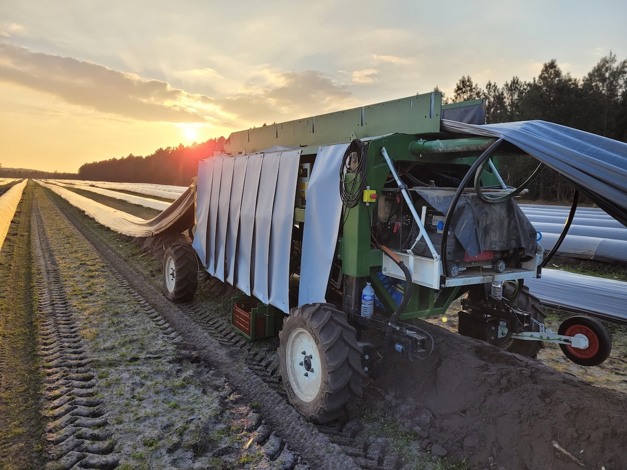AsperCut: A breakthrough innovation giving asparagus farmers back their independence?

A low-tech philosophy for greater reliability
“Our background isn’t in agriculture but in industry, and we firmly believe that industrial robotics solutions can be adapted to agriculture,” explains Wilfried Garrigue. “We launched the project in 2020 and are now on the third version of the AsperCut prototype, which is becoming highly operational and productive.”
While AsperCut isn’t the first robot developed to automate asparagus harvesting, it marks a real technological shift compared to existing models. “Rather than reinventing everything from scratch, we focused on proven, widely used technologies from both the industrial and agricultural sectors. The machine is composed of three main elements: a custom-designed straddle tool carrier, the harvesting robot, and an AI module that detects the asparagus. This pragmatic, low-tech approach makes the machine more affordable and significantly more reliable for farmers.”
A focus on harvest quality over speed
What sets AsperCut apart is its simplicity and durability, qualities the founders prioritized to win over skeptical growers. “Farmers are often wary of robotics, which can feel overly complex, fragile, and hard to use or maintain. That’s why we avoid calling it a ‘robot’; we prefer ‘harvesting machine’. Compared to existing machines, we wanted to develop something smaller, more cost-effective, and focused on harvesting quality rather than speed,” Garrigue explains. “Our machine measures 4 meters long, 2.5 meters wide and high, and weighs 3.5 tons. We’ve deliberately chosen to stop the machine when harvesting rather than moving continuously—this would require much more complex and less reliable robotics. By stopping, we ensure a cleaner, more efficient harvest. The machine can cut the asparagus in a single motion—something that’s not easily achieved by hand—and avoids pinching or damaging the spears, thereby preserving quality. We’ve also developed and patented a tool that can harvest even slightly twisted asparagus, greatly reducing harvest variability.”
Designed for moderate production areas of 2 to 4 hectares, the strategy is to sell several small machines rather than a single large one. This approach adapts easily to various farm sizes and ensures that farmers aren’t left stuck if one machine fails.
Autonomous operation powered by smart AI detection
The AsperCut operates autonomously along asparagus beds using a 3D AI-based detection system that pinpoints the exact position of each spear. “We’re at a turning point in terms of available technology,” Garrigue notes. “Cameras and computers have become far more accessible, which has allowed us to integrate this tech into our machines. Going fully electric would have been a step too far for now, but our priority is solving the harvesting challenge. The machine navigates rows on its own, detects asparagus, stops to harvest, and places the spears in a crate. Once a row is complete, it halts for an operator to collect the crates and reposition them to the next row. This process ensures asparagus isn’t left in the crates too long post-harvest. It’s a hybrid machine powered by electricity with an onboard generator for full autonomy.”

Designed for both white and green asparagus
Though the original focus was on white asparagus, Sylektis is pushing further, developing a solution for green asparagus as well. “Our vision is a modular harvesting platform that can accommodate up to two robots—one for white asparagus at the front and one for green at the back. Or even two of each for larger operations. We’re collaborating with Fanuc, the world leader in industrial robotics, to develop the green asparagus harvesting module.”
Tackling the labor crisis with a competitive edge
“The core issue today in agriculture is labor. Unlike tilling or weeding, harvesting remains a manual task, but we simply don’t have the workforce anymore. These jobs are tough and increasingly unattractive. Since harvesting is also the phase that adds the most value to the crop, AsperCut has strong potential for return on investment. With Maxime Pallin, a farmer in France’s Médoc region who has helped test our prototype for the past three years, we’ve identified the performance goals needed to meet both technical and economic demands. The 2025 season will be key to confirming those targets and launching commercial sales.”
Boosting local capacity and reducing imports through autonomy
Although harvesting costs are important, the main goal isn’t necessarily to be cheaper than seasonal labor. “The real aim is to address the labor shortage and ensure that farmers can harvest their crops. Today, 50% of asparagus is imported, and many farmers tell us they would plant and harvest more if only they had the manpower. With AsperCut, we want to empower growers to expand local production, reduce dependence on imports, and make asparagus farming more sustainable. It’s a long-term investment with environmental and economic benefits. With a plantation lasting ten years, AsperCut removes the uncertainty around labor availability for the entire lifespan of the crop. In that sense, it’s a true breakthrough innovation.”
A commitment to supporting farmers in France and beyond
As AsperCut nears industrial production, Garrigue and Abraham are approaching the next phase of their journey with confidence and ambition. “We’re proud to be the first to design and build a French-made harvesting machine. France Relance 2030 has supported us from the beginning, and we’re currently fundraising to support industrialization.
We plan to start selling the first units this year, with pre-production delivery set for 2026. Our machines will be distributed through local tractor dealers to ensure ongoing support and maintenance. Labor challenges aren’t unique to France, and we aim to bring AsperCut to farmers across Europe—and possibly further.
We’re also exploring adaptations for other crops facing the same issues, like grape harvesting. Agriculture is at risk: if we can’t harvest, we’re handing over our food sovereignty. We believe AsperCut offers a real solution, and we’re fully committed to helping farmers make this transition.”
For more information:
Wilfried Garrigue
Sylektis
wilfried.garrigue@sylektis.com